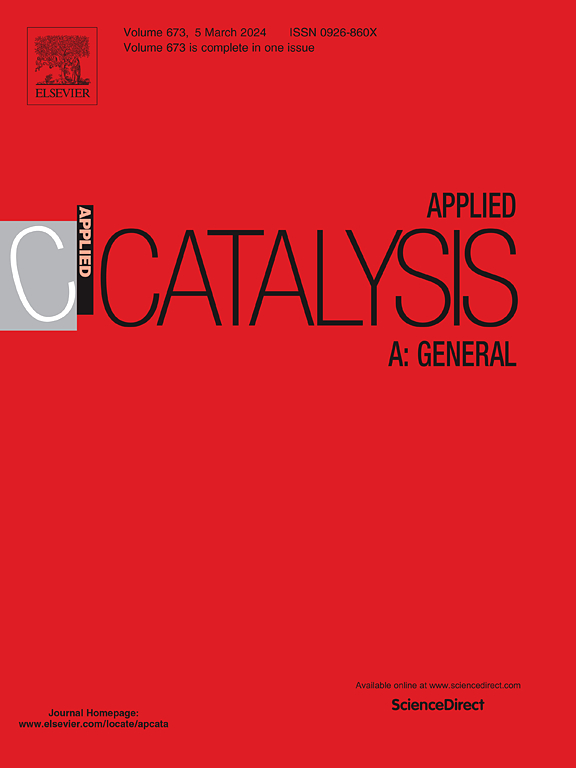Promotion effect of Al species on silica-supported cesium oxide catalyst in the vapor-phase dehydration of 1,2-propanediol to propylene oxide
IF 4.7
2区 化学
Q2 CHEMISTRY, PHYSICAL
引用次数: 0
Abstract
The introduction of Al into SiO2-supported cesium oxide (Cs/SiO2) promoted catalytic activity for the dehydration of 1,2-propanediol (1,2-PDO) to propylene oxide (PO). This improvement was attributed to the promotion of CsNO3 decomposition and the ability of Al to keep the morphology of the SiO2-supported catalyst, even though the Al component slightly reduced the concentration of the base site. The optimum molar component of Al was proven to improve the activity of Cs/SiO2 catalyst, while maintaining a low rate of side reactions, such as isomerization of PO to allyl alcohol and dehydration of 1,2-PDO to propanal. Several parameters, such as reaction temperature, contact time, Cs8Al2 content, and Al molar component influenced catalytic activity and product distributions. The poisoning experiment by use of CO2 revealed the importance of the base sites of Cs8Al2/SiO2 catalyst, while the role of acid sites was negligible as confirmed by the poisoning experiment with NH3.
在1,2-丙二醇气相脱水制环氧丙烷过程中,Al对二氧化硅负载型氧化铯催化剂的促进作用
将Al引入SiO2负载型氧化铯(Cs/SiO2)中,促进了1,2-丙二醇(1,2- pdo)脱水制环氧丙烷(PO)的催化活性。这种改善是由于促进了cno3的分解和Al保持sio2负载催化剂形态的能力,即使Al组分略微降低了碱基的浓度。实验证明,Al的最佳摩尔组分可以提高Cs/SiO2催化剂的活性,同时保持较低的副反应率,如PO异构化成烯丙醇和1,2- pdo脱水成丙醛。反应温度、接触时间、Cs8Al2含量和Al摩尔组分等参数影响催化活性和产物分布。CO2中毒实验揭示了Cs8Al2/SiO2催化剂碱位的重要性,而NH3中毒实验证实了酸位的作用可以忽略不计。
本文章由计算机程序翻译,如有差异,请以英文原文为准。
求助全文
约1分钟内获得全文
求助全文
来源期刊

Applied Catalysis A: General
化学-环境科学
CiteScore
9.00
自引率
5.50%
发文量
415
审稿时长
24 days
期刊介绍:
Applied Catalysis A: General publishes original papers on all aspects of catalysis of basic and practical interest to chemical scientists in both industrial and academic fields, with an emphasis onnew understanding of catalysts and catalytic reactions, new catalytic materials, new techniques, and new processes, especially those that have potential practical implications.
Papers that report results of a thorough study or optimization of systems or processes that are well understood, widely studied, or minor variations of known ones are discouraged. Authors should include statements in a separate section "Justification for Publication" of how the manuscript fits the scope of the journal in the cover letter to the editors. Submissions without such justification will be rejected without review.
 求助内容:
求助内容: 应助结果提醒方式:
应助结果提醒方式:


